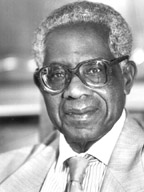






| Aimé Césaire: une voix pour l'histoire (A Voice for History)
In Part I L'Ile Veilleuse (The Vigilant Island) Césaire shows us his pays natale, its volcano, beaches and colonial towns, a tropical crossroad where Europe, Africa and America meet. From this cultural vortex, Césaire, his wife, Suzanne, and philosopher René Menil founded in 1939 the seminal literary review Tropiques which influenced Caribbean intellectuals like Wifredo Lam, René Depestre and Frantz Fanon. After the War, Césaire served as mayor of Fort-de-France and Martinique's representative to the French National Assembly. He discusses the difficulty of balancing the life of a poet with that of a practical politician for over 50 years. Part II, Au rendez-vous de la conquête (Where the Edges of Conquest Meet) moves to Paris in the 1930s where Césaire, Leopold Senghor, first president of Senegal, and the French Guyanese poet, Léon Damas, developed the concept of negritude, a world-wide revindication of African values. John Henrik Clarke and Howard Dodson of the Schomburg Center discuss the profound impact of black American authors like Langston Hughes, Richard Wright and Claude McKay as well as jazz and the Harlem Renaissance on this primarily Francophone movement. In Part III, La
force de regarder demain (The Strength to Face Tomorrow), Césaire
responds to the disappointments of the post-colonial world. His plays
La tragedie du roi Christophe (about the Haitian revolution) and Une
saison au Congo (about Patrice Lumumba) were among the first to warn
of the dangers of neo-colonialism. French anthropologist Edgar Morin,
biographer Roger Toumson, Brazilian author Jorge Amado, Antillean novelist
Maryse Condé and American writer Maya Angelou testify to Césaire's
central role as a "founding ancestor" for the current flowering of Diaspora
literature. Caribbean
Studies |
"Beautifully
captures the fighting yet gentle spirit, humanitarian insight and humor,
of a very complex man thriving through very complicated times." "A true tribute
to a great poet and his work... A magnificent symphony in which history
and politics, landscape and literature, come together." "Aimé
Césaire
is one of the most important figures in the history of Black Liberation...Euzhan
Palcy, the first major black woman director, has applied her unique
signature to produce this essential film."
Video
Purchase: $195
|
 This
monumental, three-part study introduces American audiences to the celebrated
Martinican author who coined the term negritude and launched the movement
called the "Great Black Cry". Euzhan Palcy, the internationally acclaimed
director of Sugarcane Alley and A Dry White Season, weaves
Césaire's life and poetry into a vast tapestry featuring many
of the most important artistic and intellectual figures of the past
six decades. André Breton, the high priest of surrealism, described
Césaire as, "A black man who embodies not simply the black race
but all mankind, who will remain for me the prototype of human dignity."
This
monumental, three-part study introduces American audiences to the celebrated
Martinican author who coined the term negritude and launched the movement
called the "Great Black Cry". Euzhan Palcy, the internationally acclaimed
director of Sugarcane Alley and A Dry White Season, weaves
Césaire's life and poetry into a vast tapestry featuring many
of the most important artistic and intellectual figures of the past
six decades. André Breton, the high priest of surrealism, described
Césaire as, "A black man who embodies not simply the black race
but all mankind, who will remain for me the prototype of human dignity."